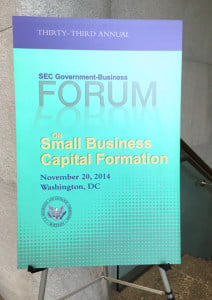 The 2014 Securities and Exchange Commission Government-Business Forum on Small Business Capital Formation ensued on November 20, 2014 at the SEC headquarters in Washington, D.C.
The 2014 Securities and Exchange Commission Government-Business Forum on Small Business Capital Formation ensued on November 20, 2014 at the SEC headquarters in Washington, D.C.
In usual form, since the signing of the Jumpstart Our Business Startups Act (JOBS Act), the crowd (attorney’s, issuers, intermediaries, regulators, investors, service providers) scurry to wait with baited breathe to hear the status of the pending rules for Titles III (Crowdfunding) and Title IV (Regulation A+). Remaining true to form the Commission did not provide any dates on when the final rules will go live for either.
The Forum is known to advance some recommendations in the past that has influenced the health of the capital markets; though it seems like no movement has been made on the recommendations that came from the 2013 Forum, specifically focusing on Title III, as I was a panelist presenting on the “Panel Discussion: Crystal Ball: Now that you raised money, what’s next for the company and the  markets?” Waiting patiently over the webcast or in person we were sure that the Thirty-Third forum would not disappoint.
markets?” Waiting patiently over the webcast or in person we were sure that the Thirty-Third forum would not disappoint.
What resonated from each Commissioner and more specifically from Commissioner Gallagher in his introduction was hope that day’s discussion would “embrace the full scope of the public and the private markets in small business securities which encompasses a fully robust capital market ecosystem for small businesses which requires both.”
Further, he continued –“There is a need for continued innovation in secondary trading in the private marketplace. If additional guidance from the SEC—for example, with respect to a private resale exemption—would help the market to develop further, we should move forward on that now.”
3 Key Points from the Commissioner’s Opening Remarks
- Promote the development of secondary markets; while a robust, liquid secondary market has benefits of its own, it also promotes the health of the primary offering market, which directly benefits small business issuers.
- Complete Regulation A+ rulemaking, mandated by the JOBS Act, in the very near future. Additionally, there’s a long-standing need for better, more liquid markets for smaller post IPO companies.
- Consider better scaling of the periodic reporting regime for small companies, to match commonly accepted market definitions of “microcap” and “nanocap.” Venture Exchanges or exchanges with similar scaled listing standards may help here as well.
It is clear that the impression to fully activate the benefits of the Regulation A+ exemption, the Commission needs to consider how to create secondary markets for these shares. Companies barely clinging to a NASDAQ or NYSE listing could fit more comfortably at a Venture Exchange, and companies currently trading OTC may be willing to up their game if the hurdle to become exchange traded wasn’t so insurmountable.
Commissioner Gallagher Views on Accredited Investor Definition brought the Audience to Applause
Frankly, he has “yet to be persuaded that this is an issue that we should be taking up at this time.” But more fundamentally, “remains baffled by the continued insistence from some quarters that there is significant need to revise the accredited investor definition. Why should we spend limited Commission resources “protecting” the wealthiest 2-3% of investors in this country? This obsession with “protecting” millionaires—potentially at the cost of hindering the wildly successful and critically important private markets—strains logic and reason. Millionaires can fend for themselves”.
“That additional government paternalism could also negatively impact the availability of capital for small companies is a double whammy, and rather than pressing our luck, we should be yelling “stop”—and instead spend our time focusing on actually facilitating capital formation.” “Dodd-Frank’s removal of the value of the primary residence for purposes of the net worth test was already a significant change to the accredited investor definition.”
 Taking in to consideration Chair White’s comments on investor protection remains on point with some of the background chatter circulating about the lack of advancement on Title III. She states,
Taking in to consideration Chair White’s comments on investor protection remains on point with some of the background chatter circulating about the lack of advancement on Title III. She states,
“we always consider carefully the impact that the suggested changes would have on investors – both in terms of what risks they may face, but also whether the change would serve to attract investors to small business investing. Obviously, regulatory changes that compromise investor protections or raise concerns for investors about investing will ultimately cost the small business community more than any benefit derived from the proposed change. Investor confidence – confidence in small business investing and in the fairness of the capital raising process – is an important guide as you discuss, test and formulate your recommendations and as we consider them. It is really the marriage of investor protection and better ways to facilitate more capital formation that makes our markets the envy of the world”.
________________________
 Kim Wales is the founder of Wales Capital and CrowdBureau, headquartered in New York City. Since 2012, she has been a sought after thought leader, speaker, author, policy reformer and democracy activist on matters related to the JOBS Act and AIFMD. Prior Kim served 17 years as an independent international banking consulting. Some of Kim’s clients included: Butterfield Bank, Chase Manhattan Bank, Depository Trust Clearing Corp, NYSE Euronext, Prudential and Morgan Stanley.
Kim Wales is the founder of Wales Capital and CrowdBureau, headquartered in New York City. Since 2012, she has been a sought after thought leader, speaker, author, policy reformer and democracy activist on matters related to the JOBS Act and AIFMD. Prior Kim served 17 years as an independent international banking consulting. Some of Kim’s clients included: Butterfield Bank, Chase Manhattan Bank, Depository Trust Clearing Corp, NYSE Euronext, Prudential and Morgan Stanley.

